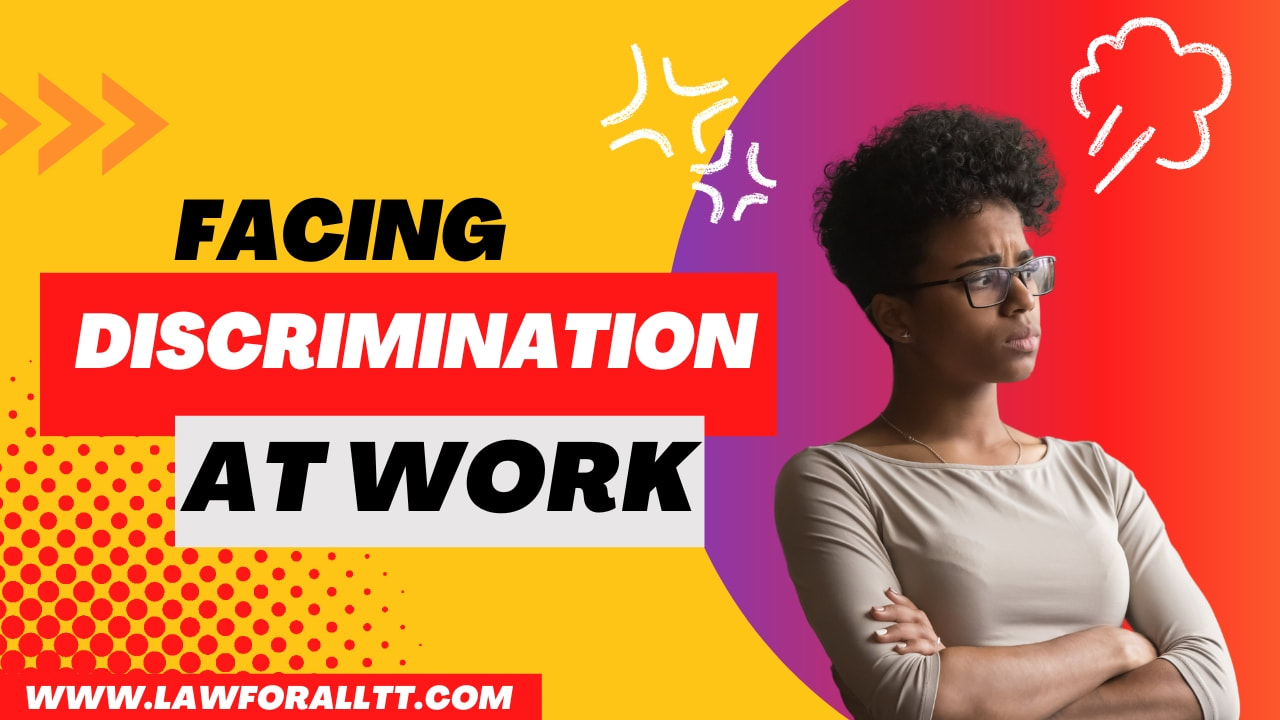|
Imagine you have applied for or you are employed by a person, company or organisation and you have been experiencing unfair treatment from that potential or current employer. What solutions or remedies are available in Trinidad and Tobago when such a situation arises? Here are 7 things you should know if you believe you are facing discrimination in the workplace.
1. First, what exactly is discrimination?
Discrimination, in simple terms, is the treatment of a person or a particular group of people differently, in a way that is worse than the way people are usually treated. 2. What laws protect us from discrimination? In Trinidad and Tobago, the Constitution guarantees citizens the general right to equality of treatment from any public authority in the exercise of any function. The Equal Opportunity Act, No. 69 of 2000 prohibits discrimination of persons on grounds of sex, race, ethnicity, origin, marital status, religion or disability. Part III of the Act deals specifically with employment discrimination. In respect of persons seeking employment, an employer is prohibited from refusing or omitting to offer employment to a person based on the above grounds of discrimination. Also, an employer shall not discriminate against an employee with regard to terms and conditions of employment, opportunities for promotion, transfer or training or any other benefit, facility or service associated with the employment. Section 4 of the Equal Opportunity Act states that the Act applies to discrimination in relation to employment if the alleged discrimination is based on-
3. What is discrimination on the ground of status?
The Equal Opportunity Act defines “status” as:
Section 5 of the Act states that a person discriminates against another person on the grounds of status if he treats the aggrieved person, in circumstances that are the same or are not materially different, less favorably than the discriminator treats a person of another status based on:
4. What is discrimination by victimisation? The discriminator discriminates by victimisation against another person if he treats the person victimised, less favorably than in those circumstances he treats or would treat other persons, and does so by reason that the person victimised has:
In making an allegation of discrimination by victimisation, the Complainant must, as stated in EOT No. 0004 of 2016 Moriba Baker v The University of Trinidad and Tobago: “show that the catalyst for the unfavourable treatment is that he (the Complainant) had either initiated action against him (the discriminator) under the Act or any relevant law or assisted some person in doing so.” Therefore the Complainant must prove that the basis for the treatment which he is receiving is due to any action which he may have initiated against the Discriminator under the Act, or some relevant law, or assisted some other person in doing so.
5. What is less favourable treatment?
In a discrimination claim based on victimisation or status, the complainant must show that he was treated less favourably than his comparator and the reason for this treatment was based on either victimisation or status. In the case of EOT No. 002 of 2014 Kerwin Simmons v Trinidad and Tobago Water and Sewerage Authority it was stated that there are TWO grounds to bring a claim of discrimination:
6. What can a person do if he or she believes he or she has been discriminated against in the workplace?
If a person believes he or she has been discriminated against, they can lodge a complaint at the Equal Opportunity Commission. The Equal Opportunity Commission was established under the Equal Opportunity Act and its mandate is to work towards the elimination of discrimination and the promotion of equality and good relations between persons of different statuses. A person who claims that he has been discriminated against can submit a written complaint setting out the details of the alleged act of discrimination to the Commission. If the complaint after investigation cannot be or is not resolved, through conciliation by the Commission, the Commission is mandated with the consent and on behalf of the Complainant, to institute proceedings before the Equal Opportunity Tribunal. The Tribunal would then hear and determine the complaint and has the power to grant powerful remedies such as injunctions to restrain acts of discrimination, fines and orders for unlimited damages (compensation).
7. Are there exceptions to workplace discrimination?
Yes there are exceptions. Exception to Discrimination on grounds of sex According to section 11 of the Equal Opportunity Act there may be discrimination on the grounds of sex in a case where being of a particular sex is a genuine occupational qualification for employment, promotion, transfer or training. Being of a particular sex is a genuine occupational qualification if--
Exception to Discrimination on grounds of race
According to section 11(3) of the Equal Opportunity Act, there may be discrimination on the grounds of race where the duties relating to the employment or training involve participation in a dramatic performance or other entertainment in a capacity for which a person of a particular race is required for reasons of authenticity or the duties relating to the employment or training involve participation as an artist’s photographic or exhibition model in the production of a work or art, visual image or sequence of visual images for which a person of a particular race is required for reasons of authenticity. Exception to Discrimination on grounds of religion According to section 12 of the Equal Opportunity Act, there may be discrimination on the ground of religion in a case where being of a particular religion is a necessary qualification for employment in a religious shop. Exception to Discrimination in employment of persons for domestic or personal services According to section 13(1) of Equal Opportunity Act, there may be discrimination in the employment of persons in domestic or personal services in or in relation to the home of the employer - but this exception can apply to a maximum of three employees. Exception to Discrimination in relation to favourable employment of relatives versus non-relatives. According to section 13(2) of the Equal Opportunity Act, a family business may employ relatives in favour of non-relatives. Exception to Discrimination in relation to the employment of a person with a disability According to section 14 of the Equal Opportunity Act, there may be discrimination in relation to the employment of a person with a disability where:
Important Notice: This post does not constitute legal advice. Always consult with an attorney on any legal problem or issue.
This website is managed by AURORA Chambers; a law practice in Trinidad and Tobago. Click HERE to receive updates straight to your inbox by subscribing to our newsletter.
0 Comments
Leave a Reply. |
Categories
All
Archives
June 2024
|
LawForAllTT.com |
|









 RSS Feed
RSS Feed